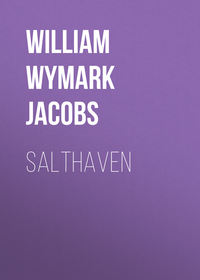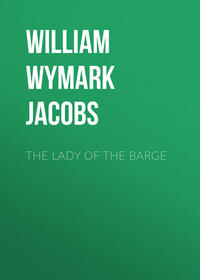 полная версия
полная версияCaptains All and Others
We were six or seven days out when a strange thing happened. Dadd had the second watch one night, and Bill was to relieve him. They were not very strict aboard the brig in fair weather, and when a man’s time was up he just made the wheel fast, and, running for’ard, shouted down the fo’c’s’le. On this night I happened to awake suddenly, in time to see Bill slip out of his bunk and stand by me, rubbing his red eyelids with his knuckles.
“Dadd’s giving me a long time,” he whispered, seeing that I was awake; “it’s a whole hour after his time.”
He pattered up on deck, and I was just turning over, thankful that I was too young to have a watch to keep, when he came softly down again, and, taking me by the shoulders, shook me roughly.
“Jack,” he whispered. “Jack.”
I raised myself on my elbows, and, in the light of the smoking lamp, saw that he was shaking all over.
“Come on deck,” he said, thickly.
I put on my clothes, and followed him quietly to the sweet, cool air above. It was a beautiful clear night, but, from his manner, I looked nervously around for some cause of alarm. I saw nothing. The deck was deserted, except for the solitary figure at the wheel.
“Look at him,” whispered Bill, bending a contorted face to mine.
I walked aft a few steps, and Bill followed slowly. Then I saw that Jem Dadd was leaning forward clumsily on the wheel, with his hands clenched on the spokes.
“He’s asleep,” said I, stopping short.
Bill breathed hard. “He’s in a queer sleep,” said he; “kind o’ trance more like. Go closer.”
I took fast hold of Bill’s sleeve, and we both went. The light of the stars was sufficient to show that Dadd’s face was very white, and that his dim, black eyes were wide open, and staring in a very strange and dreadful manner straight before him.
“Dadd,” said I, softly, “Dadd!”
There was no reply, and, with a view of arousing him, I tapped one sinewy hand as it gripped the wheel, and even tried to loosen it.
He remained immovable, and, suddenly with a great cry, my courage deserted me, and Bill and I fairly bolted down into the cabin and woke the skipper.
Then we saw how it was with Jem, and two strong seamen forcibly loosened the grip of those rigid fingers, and, laying him on the deck, covered him with a piece of canvas. The rest of the night two men stayed at the wheel, and, gazing fearfully at the outline of the canvas, longed for dawn.
It came at last, and, breakfast over, the body was sewn up in canvas, and the skipper held a short service compiled from a Bible which belonged to the mate, and what he remembered of the Burial Service proper. Then the corpse went overboard with a splash, and the men, after standing awkwardly together for a few minutes, slowly dispersed to their duties.
For the rest of that day we were all very quiet and restrained; pity for the dead man being mingled with a dread of taking the wheel when night came.
“The wheel’s haunted,” said the cook, solemnly; “mark my words, there’s more of you will be took the same way Dadd was.”
The cook, like myself, had no watch to keep.
The men bore up pretty well until night came on again, and then they unanimously resolved to have a double watch. The cook, sorely against his will, was impressed into the service, and I, glad to oblige my patron, agreed to stay up with Bill.
Some of the pleasure had vanished by the time night came, and I seemed only just to have closed my eyes when Bill came, and, with a rough shake or two, informed me that the time had come. Any hope that I might have had of escaping the ordeal was at once dispelled by his expectant demeanour, and the helpful way in which he assisted me with my clothes, and, yawning terribly, I followed him on deck.
The night was not so clear as the preceding one, and the air was chilly, with a little moisture in it. I buttoned up my jacket, and thrust my hands in my pockets.
“Everything quiet?” asked Bill as he stepped up and took the wheel.
“Ay, ay,” said Roberts, “quiet as the grave,” and, followed by his willing mate, he went below.
I sat on the deck by Bill’s side as, with a light touch on the wheel, he kept the brig to her course. It was weary work sitting there, doing nothing, and thinking of the warm berth below, and I believe that I should have fallen asleep, but that my watchful companion stirred me with his foot whenever he saw me nodding.
I suppose I must have sat there, shivering and yawning, for about an hour, when, tired of inactivity, I got up and went and leaned over the side of the vessel. The sound of the water gurgling and lapping by was so soothing that I began to doze.
I was recalled to my senses by a smothered cry from Bill, and, running to him, I found him staring to port in an intense and uncomfortable fashion. At my approach, he took one hand from the wheel, and gripped my arm so tightly that I was like to have screamed with the pain of it.
“Jack,” said he, in a shaky voice, “while you was away something popped its head up, and looked over the ship’s side.”
“You’ve been dreaming,” said I, in a voice which was a very fair imitation of Bill’s own.
“Dreaming,” repeated Bill, “dreaming! Ah, look there!”
He pointed with outstretched finger, and my heart seemed to stop beating as I saw a man’s head appear above the side. For a brief space it peered at us in silence, and then a dark figure sprang like a cat on to the deck, and stood crouching a short distance away.
A mist came before my eyes, and my tongue failed me, but Bill let off a roar, such as I have never heard before or since. It was answered from below, both aft and for’ard, and the men came running up on deck just as they left their beds.
“What’s up?” shouted the skipper, glancing aloft.
For answer, Bill pointed to the intruder, and the men, who had just caught sight of him, came up and formed a compact knot by the wheel.
“Come over the side, it did,” panted Bill, “come over like a ghost out of the sea.”
The skipper took one of the small lamps from the binnacle, and, holding it aloft, walked boldly up to the cause of alarm. In the little patch of light we saw a ghastly black-bearded man, dripping with water, regarding us with unwinking eyes, which glowed red in the light of the lamp.
“Where did you come from?” asked the skipper.
The figure shook its head.
“Where did you come from?” he repeated, walking up, and laying his hand on the other’s shoulder.
Then the intruder spoke, but in a strange fashion and in strange words. We leaned forward to listen, but, even when he repeated them, we could make nothing of them.
“He’s a furriner,” said Roberts.
“Blest if I’ve ever ‘eard the lingo afore,” said Bill. “Does anybody rekernize it?”
Nobody did, and the skipper, after another attempt, gave it up, and, falling back upon the universal language of signs, pointed first to the man and then to the sea. The other understood him, and, in a heavy, slovenly fashion, portrayed a man drifting in an open boat, and clutching and clambering up the side of a passing ship. As his meaning dawned upon us, we rushed to the stern, and, leaning over, peered into the gloom, but the night was dark, and we saw nothing.
“Well,” said the skipper, turning to Bill, with a mighty yawn, “take him below, and give him some grub, and the next time a gentleman calls on you, don’t make such a confounded row about it.”
He went below, followed by the mate, and after some slight hesitation, Roberts stepped up to the intruder, and signed to him to follow. He came stolidly enough, leaving a trail of water on the deck, and, after changing into the dry things we gave him, fell to, but without much appearance of hunger, upon some salt beef and biscuits, regarding us between bites with black, lack-lustre eyes.
“He seems as though he’s a-walking in his sleep,” said the cook.
“He ain’t very hungry,” said one of the men; “he seems to mumble his food.”
“Hungry!” repeated Bill, who had just left the wheel. “Course he ain’t famished. He had his tea last night.”
The men stared at him in bewilderment.
“Don’t you see?” said Bill, still in a hoarse whisper; “ain’t you ever seen them eyes afore? Don’t you know what he used to say about dying? It’s Jem Dadd come back to us. Jem Dadd got another man’s body, as he always said he would.”
“Rot!” said Roberts, trying to speak bravely, but he got up, and, with the others, huddled together at the end of the fo’c’s’le, and stared in a bewildered fashion at the sodden face and short, squat figure of our visitor. For his part, having finished his meal, he pushed his plate from him, and, leaning back on the locker, looked at the empty bunks.
Roberts caught his eye, and, with a nod and a wave of his hand, indicated the bunks. The fellow rose from the locker, and, amid a breathless silence, climbed into one of them—Jem Dadd’s!
He slept in the dead sailor’s bed that night, the only man in the fo’c’s’le who did sleep properly, and turned out heavily and lumpishly in the morning for breakfast.
The skipper had him on deck after the meal, but could make nothing of him. To all his questions he replied in the strange tongue of the night before, and, though our fellows had been to many ports, and knew a word or two of several languages, none of them recognized it. The skipper gave it up at last, and, left to himself, he stared about him for some time, regardless of our interest in his movements, and then, leaning heavily against the side of the ship, stayed there so long that we thought he must have fallen asleep.
“He’s half-dead now!” whispered Roberts.
“Hush!” said Bill, “mebbe he’s been in the water a week or two, and can’t quite make it out. See how he’s looking at it now.”
He stayed on deck all day in the sun, but, as night came on, returned to the warmth of the fo’c’s’le. The food we gave him remained untouched, and he took little or no notice of us, though I fancied that he saw the fear we had of him. He slept again in the dead man’s bunk, and when morning came still lay there.
Until dinner-time, nobody interfered with him, and then Roberts, pushed forward by the others, approached him with some food. He motioned, it away with a dirty, bloated hand, and, making signs for water, drank it eagerly.
For two days he stayed there quietly, the black eyes always open, the stubby fingers always on the move. On the third morning Bill, who had conquered his fear sufficiently to give him water occasionally, called softly to us.
“Come and look at him,” said he. “What’s the matter with him?”
“He’s dying!” said the cook, with a shudder.
“He can’t be going to die yet!” said Bill, blankly.
As he spoke the man’s eyes seemed to get softer and more life-like, and he looked at us piteously and helplessly. From face to face he gazed in mute inquiry, and then, striking his chest feebly with his fist, uttered two words.
We looked at each other blankly, and he repeated them eagerly, and again touched his chest.
“It’s his name,” said the cook, and we all repeated them.
He smiled in an exhausted fashion, and then, rallying his energies, held up a forefinger; as we stared at this new riddle, he lowered it, and held up all four fingers, doubled.
“Come away,” quavered the cook; “he’s putting a spell on us.”
We drew back at that, and back farther still, as he repeated the motions. Then Bill’s face cleared suddenly, and he stepped towards him.
“He means his wife and younkers!” he shouted eagerly. “This ain’t no Jem Dadd!”
It was good then to see how our fellows drew round the dying sailor, and strove to cheer him. Bill, to show he understood the finger business, nodded cheerily, and held his hand at four different heights from the floor. The last was very low, so low that the man set his lips together, and strove to turn his heavy head from us.
“Poor devil!” said Bill, “he wants us to tell his wife and children what’s become of him. He must ha’ been dying when he come aboard. What was his name, again?”
But the name was not easy to English lips, and we had already forgotten it.
“Ask him again,” said the cook, “and write it down. Who’s got a pen?”
He went to look for one as Bill turned to the sailor to get him to repeat it. Then he turned round again, and eyed us blankly, for, by this time, the owner had himself forgotten it.
THE FOUR PIGEONS
The old man took up his mug and shifted along the bench until he was in the shade of the elms that stood before the Cauliflower. The action also had the advantage of bringing him opposite the two strangers who were refreshing themselves after the toils of a long walk in the sun.
“My hearing ain’t wot it used to be,” he said, tremulously. “When you asked me to have a mug o’ ale I ‘ardly heard you; and if you was to ask me to ‘ave another, I mightn’t hear you at all.”
One of the men nodded.
“Not over there,” piped the old man. “That’s why I come over here,” he added, after a pause. “It ‘ud be rude like to take no notice; if you was to ask me.”
He looked round as the landlord approached, and pushed his mug gently in his direction. The landlord, obeying a nod from the second stranger, filled it.
“It puts life into me,” said the old man, raising it to his lips and bowing. “It makes me talk.”
“Time we were moving, Jack,” said the first traveller. The second, assenting to this as an abstract proposition, expressed, however, a determination to finish his pipe first.
I heard you saying something about shooting, continued the old man, and that reminds me of some shooting we ‘ad here once in Claybury. We’ve always ‘ad a lot o’ game in these parts, and if it wasn’t for a low, poaching fellow named Bob Pretty—Claybury’s disgrace I call ‘im—we’d ‘ave a lot more.
It happened in this way. Squire Rockett was going abroad to foreign parts for a year, and he let the Hall to a gentleman from London named Sutton. A real gentleman ‘e was, open-’anded and free, and just about October he ‘ad a lot of ‘is friends come down from London to ‘elp ‘im kill the pheasants.
The first day they frightened more than they killed, but they enjoyed theirselves all right until one gentleman, who ‘adn’t shot a single thing all day, shot pore Bill Chambers wot was beating with about a dozen more.
Bill got most of it in the shoulder and a little in the cheek, but the row he see fit to make you’d ha’ thought he’d been killed. He laid on the ground groaning with ‘is eyes shut, and everybody thought ‘e was dying till Henery Walker stooped down and asked ‘im whether ‘e was hurt.
It took four men to carry Bill ‘ome, and he was that particular you wouldn’t believe. They ‘ad to talk in whispers, and when Peter Gubbins forgot ‘imself and began to whistle he asked him where his ‘art was. When they walked fast he said they jolted ‘im, and when they walked slow ‘e asked ‘em whether they’d gone to sleep or wot.
Bill was in bed for nearly a week, but the gentleman was very nice about it and said that it was his fault. He was a very pleasant-spoken gentleman, and, arter sending Dr. Green to him and saying he’d pay the bill, ‘e gave Bill Chambers ten pounds to make up for ‘is sufferings.
Bill ‘ad intended to lay up for another week, and the doctor, wot ‘ad been calling twice a day, said he wouldn’t be responsible for ‘is life if he didn’t; but the ten pounds was too much for ‘im, and one evening, just a week arter the accident, he turned up at this Cauliflower public-’ouse and began to spend ‘is money.
His face was bandaged up, and when ‘e come in he walked feeble-like and spoke in a faint sort o’ voice. Smith, the landlord, got ‘im a easy-chair and a couple of pillers out o’ the parlour, and Bill sat there like a king, telling us all his sufferings and wot it felt like to be shot.
I always have said wot a good thing beer is, and it done Bill more good than doctor’s medicine. When he came in he could ‘ardly crawl, and at nine o’clock ‘e was out of the easy-chair and dancing on the table as well as possible. He smashed three mugs and upset about two pints o’ beer, but he just put his ‘and in his pocket and paid for ‘em without a word.
“There’s plenty more where that came from,” he ses, pulling out a handful o’ money.
Peter Gubbins looked at it, ‘ardly able to speak. “It’s worth while being shot to ‘ave all that money,” he ses, at last.
“Don’t you worry yourself, Peter,” ses Bob Pretty; “there’s plenty more of you as’ll be shot afore them gentlemen at the Hall ‘as finished. Bill’s the fust, but ‘e won’t be the last—not by a long chalk.”
“They’re more careful now,” ses Dicky Weed, the tailor.
“All right; ‘ave it your own way,” ses Bob, nasty-like. “I don’t know much about shooting, being on’y a pore labourin’ man. All I know is I shouldn’t like to go beating for them. I’m too fond o’ my wife and family.”
“There won’t be no more shot,” ses Sam Jones.
“We’re too careful,” ses Peter Gubbins.
“Bob Pretty don’t know everything,” ses Dicky Weed.
“I’ll bet you what you like there’ll be some more of you shot,” ses Bob Pretty, in a temper. “Now, then.”
“‘Ow much’ll you bet, Bob,” ses Sam Jones, with a wink at the others. “I can see you winking, Sam Jones,” ses Bob Pretty, “but I’ll do more than bet. The last bet I won is still owing to me. Now, look ‘ere; I’ll pay you sixpence a week all the time you’re beating if you promise to give me arf of wot you get if you’re shot. I can’t say fairer than that.”
“Will you give me sixpence a week, too?” ses Henery Walker, jumping up.
“I will,” ses Bob; “and anybody else that likes. And wot’s more, I’ll pay in advance. Fust sixpences now.”
Claybury men ‘ave never been backward when there’s been money to be made easy, and they all wanted to join Bob Pretty’s club, as he called it. But fust of all ‘e asked for a pen and ink, and then he got Smith, the land-lord, being a scholard, to write out a paper for them to sign. Henery Walker was the fust to write ‘is name, and then Sam Jones, Peter Gubbins, Ralph Thomson, Jem Hall, and Walter Bell wrote theirs. Bob stopped ‘em then, and said six ‘ud be enough to go on with; and then ‘e paid up the sixpences and wished ‘em luck.
Wot they liked a’most as well as the sixpences was the idea o’ getting the better o’ Bob Pretty. As I said afore, he was a poacher, and that artful that up to that time nobody ‘ad ever got the better of ‘im.
They made so much fun of ‘im the next night that Bob turned sulky and went off ‘ome, and for two or three nights he ‘ardly showed his face; and the next shoot they ‘ad he went off to Wickham and nobody saw ‘im all day.
That very day Henery Walker was shot. Several gentlemen fired at a rabbit that was started, and the next thing they knew Henery Walker was lying on the ground calling out that ‘is leg ‘ad been shot off.
He made more fuss than Bill Chambers a’most, ‘specially when they dropped ‘im off a hurdle carrying him ‘ome, and the things he said to Dr. Green for rubbing his ‘ands as he came into the bedroom was disgraceful.
The fust Bob Pretty ‘eard of it was up at the Cauliflower at eight o’clock that evening, and he set down ‘is beer and set off to see Henery as fast as ‘is legs could carry ‘im. Henery was asleep when ‘e got there, and, do all he could, Bob Pretty couldn’t wake ‘im till he sat down gentle on ‘is bad leg.
“It’s on’y me, old pal,” he ses, smiling at ‘im as Henery woke up and shouted at ‘im to get up.
Henery Walker was going to say something bad, but ‘e thought better of it, and he lay there arf busting with rage, and watching Bob out of the corner of one eye.
“I quite forgot you was on my club till Smith reminded me of it,” ses Bob. “Don’t you take a farthing less than ten pounds, Henery.”
Henery Walker shut his eyes again. “I forgot to tell you I made up my mind this morning not to belong to your club any more, Bob,” he ses.
“Why didn’t you come and tell me, Henery, instead of leaving it till it was too late?” ses Bob, shaking his ‘ead at ‘im.
“I shall want all that money,” ses Henery in a weak voice. “I might ‘ave to have a wooden leg, Bob.”
“Don’t meet troubles arf way, Henery,” ses Bob, in a kind voice. “I’ve no doubt Mr. Sutton’ll throw in a wooden leg if you want it, and look here, if he does, I won’t trouble you for my arf of it.”
He said good-night to Henery and went off, and when Mrs. Walker went up to see ‘ow Henery was getting on he was carrying on that alarming that she couldn’t do nothing with ‘im.
He was laid up for over a week, though it’s my opinion he wasn’t much hurt, and the trouble was that nobody knew which gentleman ‘ad shot ‘im. Mr. Sutton talked it over with them, and at last, arter a good deal o’ trouble, and Henery pulling up ‘is trousers and showing them ‘is leg till they was fair sick of the sight of it, they paid ‘im ten pounds, the same as they ‘ad Bill.
It took Bob Pretty two days to get his arf, but he kept very quiet about it, not wishing to make a fuss in the village for fear Mr. Sutton should get to hear of the club. At last he told Henery Walker that ‘e was going to Wickham to see ‘is lawyer about it, and arter Smith the landlord ‘ad read the paper to Henery and explained ‘ow he’d very likely ‘ave to pay more than the whole ten pounds then, ‘e gave Bob his arf and said he never wanted to see ‘im again as long as he lived.
Bob stood treat up at the Cauliflower that night, and said ‘ow bad he’d been treated. The tears stood in ‘is eyes a’most, and at last ‘e said that if ‘e thought there was going to be any more fuss of that kind he’d wind up the club.
“It’s the best thing you can do,” ses Sam Jones; “I’m not going to belong to it any longer, so I give you notice. If so be as I get shot I want the money for myself.”
“Me, too,” ses Peter Gubbins; “it ‘ud fair break my ‘art to give Bob Pretty five pounds. I’d sooner give it to my wife.”
All the other chaps said the same thing, but Bob pointed out to them that they ‘ad taken their sixpences on’y the night afore, and they must stay in for the week. He said that was the law. Some of ‘em talked about giving ‘im ‘is sixpences back, but Bob said if they did they must pay up all the sixpences they had ‘ad for three weeks. The end of it was they said they’d stay in for that week and not a moment longer.
The next day Sam Jones and Peter Gubbins altered their minds. Sam found a couple o’ shillings that his wife ‘ad hidden in her Sunday bonnet, and Peter Gubbins opened ‘is boy’s money-box to see ‘ow much there was in it. They came up to the Cauliflower to pay Bob their eighteen-pences, but he wasn’t there, and when they went to his ‘ouse Mrs. Pretty said as ‘ow he’d gone off to Wickham and wouldn’t be back till Saturday. So they ‘ad to spend the money on beer instead.
That was on Tuesday, and things went on all right till Friday, when Mr. Sutton ‘ad another shoot. The birds was getting scarce and the gentlemen that anxious to shoot them there was no ‘olding them. Once or twice the keepers spoke to ‘em about carefulness, and said wot large families they’d got, but it wasn’t much good. They went on blazing away, and just at the corner of the wood Sam Jones and Peter Gubbins was both hit; Sam in the leg and Peter in the arm.
The noise that was made was awful—everybody shouting that they ‘adn’t done it, and all speaking at once, and Mr. Sutton was dancing about a’most beside ‘imself with rage. Pore Sam and Peter was ‘elped along by the others; Sam being carried and Peter led, and both of ‘em with the idea of getting all they could out of it, making such ‘orrible noises that Mr. Sutton couldn’t hear ‘imself calling his friends names.
“There seems to be wounded men calling out all over the place,” he ses, in a temper.
“I think there is another one over there, sir,” ses one o’ the keepers, pointing.
Sam Jones and Peter Gubbins both left off to listen, and then they all heard it distinctly. A dreadful noise it was, and when Mr. Sutton and one or two more follered it up they found poor Walter Bell lying on ‘is face in a bramble.
“Wot’s the matter?” ses Mr. Sutton, shouting at ‘im.
“I’ve been shot from behind,” ses Walter. “I’d got something in my boot, and I was just stooping down to fasten it up agin when I got it.
“But there oughtn’t to be anybody ‘ere,” ses Mr. Sutton to one of the keepers.
“They get all over the place, sir,” ses the ‘keeper, scratching his ‘ead. “I fancied I ‘eard a gun go off here a minute or two arter the others was shot.”









